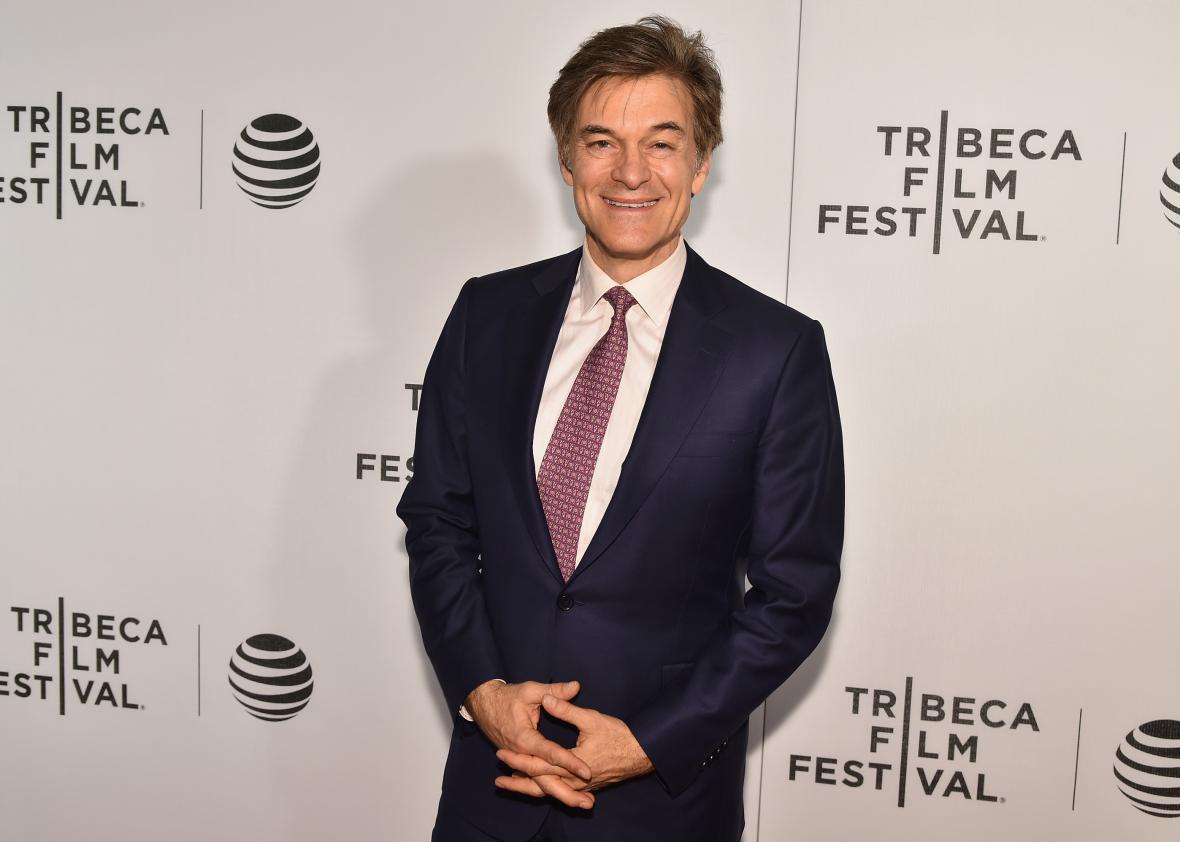Donald Trump taped his segment on The Dr. Oz Show on Wednesday, and as reports from the taping dribbled out, most focused on how much Trump disclosed about his own health. All will be revealed when the episode airs on Thursday at 1 p.m., but in the meantime, it’s worthwhile to ask why Trump chose Mehmet Oz to interview him about health-related issues in the first place. (“Interview” should maybe go in quotes—Oz avowed ahead of time that he wouldn’t ask Trump any questions Trump didn’t want to answer, not exactly standard practice for either a journalist or a physician.)
Oz, a cardiothoracic surgeon and director of the Integrative Medicine Center at Columbia University, is perhaps the best-known medical doctor in America, and his syndicated show attracts millions of viewers. He also has a history of promoting scientifically unsupported therapies and giving unscrupulous supplement manufacturers a platform from which to prey on consumers. The sins of Dr. Oz have been thoroughly and repeatedly detailed by reporters, scientists, and government investigators, but here’s a refresher course on just a few of them.
The Dr. Oz Show is a goldmine of bad medical advice that lacks evidence. Oz has promoted garcinia extract, green coffee beans, zinc, and raspberry ketones as “magic,” “holy grail” weight-loss aids, even though clinical studies have failed to show any of these supplements as more effective than a placebo. “He has recommended fish oil supplements for improved cardiovascular health and vitamin D to stave off colon, prostate, and breast cancers and to slow aging,” Julia Belluz and Steven J. Hoffman wrote in Slate in 2013. “While some evidence supports the importance of fish and vitamin D in the diet, studies on supplements have not shown protective effects.” Belluz and Hoffman also found that Oz’s recommendations on milk thistle, baby aspirin, probiotics, and multivitamins conflicted with available scientific evidence, and in some cases even put people at risk of dangerous side effects. A more recent examination of Dr. Oz’s recommendations published in the BMJ (formerly the British Medical Journal) found that only 46 percent of them were supported by empirical evidence.
Oz’s pseudoscientific recommendations are bad enough, but he’s also allowed people with enormous conflicts of interest to appear on his show without disclaimers. The most notorious example, which was investigated by the Federal Trade Commission, involved Lindsey Duncan, who appeared on The Dr. Oz Show to promote those aforementioned green coffee beans. Duncan didn’t mention that he had begun “selling the extract and tailored a marketing campaign around his appearance on the show to capitalize on the ‘Oz effect’—a phenomenon in which discussion of a product on the program causes an increase in consumer demand,” in the words of an FTC press release. Duncan agreed to pay $9 million for consumer redress in his settlement with the FTC, and Oz got chewed out for his role in the scam by Sen. Claire McCaskill in a hearing before a Senate committee tasked with consumer protection.
Oz’s well-publicized history of overblown claims and lack of disclosure should be enough to make anyone skeptical of his medical advice, and yet people still keep coming back for more. (This should sound dispiritingly familiar.) But Trump and Oz are alike in ways that go beyond their uncanny grasp of how to reach the masses through the wonders of television.
One may have made his name as a doctor and the other a businessman, but Oz’s and Trump’s worldviews are much the same. In Oz’s universe, a supplement is a miracle weight-loss aid because a tiny study funded by the supplement’s manufacturer showed promising results, or because a single person experienced dramatic results while taking it. No scientist would ever base recommendations on such dubious and anecdotal evidence, but Oz does it without hesitation. Oz’s sources are no more reliable than the (possibly imaginary) friends whom Trump cites when he’s trying to make the case for building a wall on the border with Mexico or banning Muslims from entering the U.S. Indeed, Trump favors broad proclamations over evidence-based anything—even when the topic is science itself.
It comes as no surprise that Trump chose Oz when he was looking for a friendly interlocutor to pose questions about his health. Trump and Oz are both men who are comfortable looking into TV cameras and stating bald-faced lies, men who routinely assert that things are true simply because they believe that they are true, men who earn their living, at least in part, by selling people on fraudulent products. Oz’s medical degree, Ivy League pedigree, and telegenic charisma might make his message seem more plausible, but make no mistake: Oz and Trump both live in a world where facts don’t matter.
